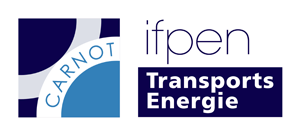IFPEN’s commitment to the development of a sustainable energy mix is reflected in actions aimed at:
• increasing energy efficiency;
• reducing CO2 and pollutant emissions;
• improving the environmental footprint of industry and transport;
• while meeting the global demand for mobility, energy and products for the chemicals sector.
With these objectives in mind, IFPEN develops solutions making it possible, firstly, to use alternative energy sources and, secondly, to improve existing technologies associated with the use of fossil energies.

|  |  |  |
Climate, environment and circular economy
- CO2 capture, utilization and storage (CCUS)
IFPEN’s research activities focus on three areas: CO2 capture processes, large-scale CO2 storage technologies and the monitoring of storage sites, in order to guarantee their long-term safety and sustainability.
- All about CO2 capture, utilization and storage
- Our expertise and solutions
- Plastics recycling
IFPEN is an active player in the field of chemical recycling, which is likely to play a role alongside mechanical recycling to convert some waste plastics. Its research is aimed at developing efficient, cost-effective technologies.
- All about plastic recycling
- Our expertise and solutions
- Environmental monitoring
The aim of IFPEN’s research activities is to develop exploration, characterization, exploitation and monitoring methods enabling the safe development of new energy technologies hinged around the use of the underground environment.
- Our expertise and solutions
- Life cycle analysis (LCA)
IFPEN researches and develops methodologies aimed at evaluating the performance of the energy and transport sectors.
- All about life cycle analysis
- Our expertise and solutions
- Metal recycling
IFPEN’s research activities are aimed at proposing eco-efficient rare earth production and recycling technologies to support the development of new energy transition sectors.
- All about metals in the energy transition
- Our expertise and solutions
Renewable energies
- Biofuels and e-fuels
From the pretreatment of biomass to fuel production, via the optimization and integration of the different steps, IFPEN’s research covers the entire process chain.
- All about biofuels
- Our expertise and solutions
- Biogas
IFPEN develops eco-efficient biogas purification processes prior to reinjection into the network.
- All about biogas and biomethane
- Our expertise and solutions
- Bio-based chemistry
IFPEN is working on the development of processes, catalysts and biocatalysts for the transformation of biomass into bases for the chemicals sector (alcohols, olefins and aromatics).
- All about bio-based chemistry
- Our expertise and solutions
- Wind energy
IFPEN is contributing to the growth of the wind energy sector, from resource evaluation through to the development of efficient control systems. IFPEN is also contributing to the development of efficient wave energy technology that can be used by industry.
- All about wind power and ocean energies
- Our expertise and solutions
- Geothermal energy
IFPEN’s research is aimed at overcoming the technical and economic challenges hampering the industrial development of geothermal energy.
- All about geothermal energy
- Our expertise and solutions
- Hydrogen
IFPEN is developing economically sustainable technologies to integrate hydrogen into the energy mix.
- All about hydrogen
- Our expertise and solutions
- Energy storage
IFPEN focuses its activities on improving electric energy surface storage processes, adapted to network services, such as microgrids.
- All about energy storage
- Our expertise and solutions
Sustainable mobility
 IFPEN’s activities in this field are conducted within the framework of the Carnot IFPEN Transports Energie.
IFPEN’s activities in this field are conducted within the framework of the Carnot IFPEN Transports Energie.
- Electrified Mobility
IFPEN's research covers the development of innovative, efficient electric machines with a high specific power, along with their power electronics. IFPEN also focuses on the electrification of powertrain functions, as well as lost thermal energy recovery systems.
- All about electric vehicles
- Our expertise and solutions
- Batteries
IFPEN develops technologies concerning, on the one hand, the development and recycling of battery materials and, on the other hand, the characterization and modeling of battery behavior.
- Our expertise and solutions
- Environmental Analysis of Transport
IFPEN develops tools to meet the objectives of decarbonization and reducing pollutant gas emissions from mobility. Based on data and modeling, these tools enable local authorities, road transport professionals, and the general public to understand the impacts of today's uses and build tomorrow's trajectories.
- Our expertise and solutions
- IC powertrains
IFPEN conducts research aimed at improving IC engines in terms of energy efficiency, the reduction in pollutant emissions and pollution control, as well as the optimization of fuel use, particularly low-carbon fuels.
- All about internal combustion engines
- Our expertise and solutions
Responsible oil and gas
- Fuels
IFPEN’s research activities concern the development of hydrodesulfurization, hydrotreatment, catalytic reforming and paraffin isomerization catalysts and processes, for the production of more environmentally-friendly fuels.
- All about oil
- Our expertise and solutions
- Petrochemicals
IFPEN’s research focuses on the development of olefin and aromatic production catalysts and processes with a view to improving the performance of existing technologies, increasing the purity of the products obtained and consuming less energy.
- All about oil
- Our expertise and solutions
- Gas treatment
IFPEN studies natural gas conversion, firstly for centralized hydrogen production via the development of highly energy-efficient processes and, secondly, for liquid fuel production. IFPEN also focuses on natural gas sweetening.
- All about natural gas
- Our expertise and solutions
- Basins and reservoirs modeling and simulation
IFPEN develops innovative underground modelling and simulation solutions, at the scale of both sedimentary basins and reservoirs. These solutions are useful to manage uncertainties and to reduce risks related to underground exploration and exploitation.
- Our expertise and solution





